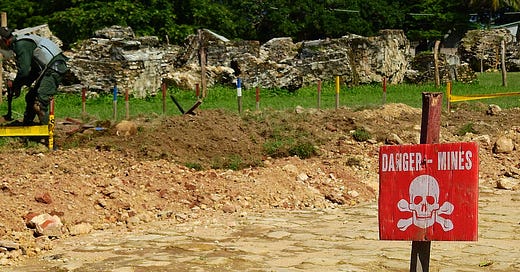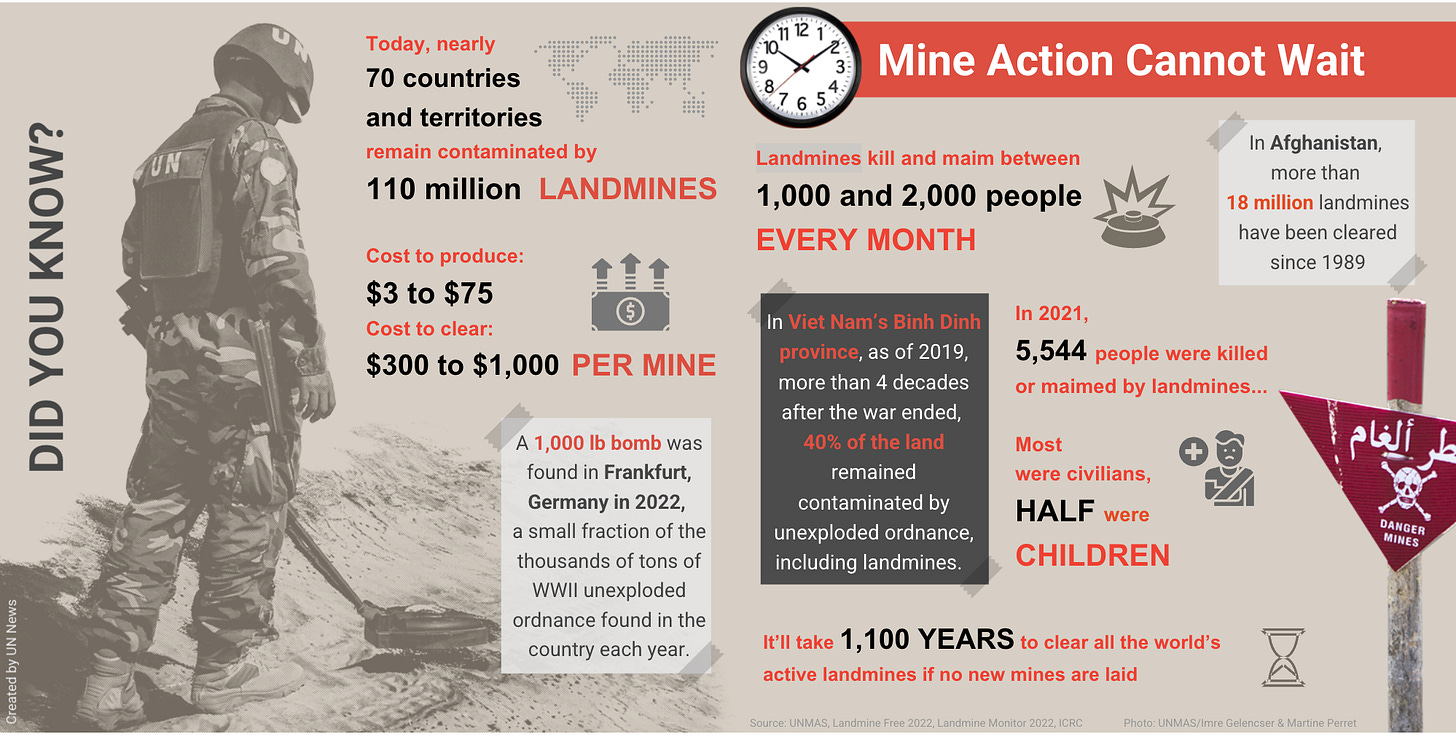Mines at Jaffna Fort, Sri Lanka. Photo by Rehman Abubakr, CC-BY-SA-4.0.
The New York Times has reported that the U.S. State Department has paused funding for programs that clear land mines and other unexploded ordnance around the world. This pause in funding will last for at least 90 days and is part of a halt to almost all foreign aid. The legality of this pause is tenuous at best. The Impoundment Control Act of 1974 governs the means by which a president can request Congress to withhold congressionally-appropriated funds. The Act is ostensibly for allowing the re-obligation of funds from programs that didn’t need as much funding as originally thought, not for withholding funds for 3 months due to policy differences.
This funding freeze is exactly prescribed by Project 2025: “Upon inauguration, the Secretary of State should order an immediate freeze on all efforts to implement unratified treaties and international agreements, allocation of resources, foreign assistance disbursements, domestic and international contracts and payments, hiring and recruiting decisions, etc., pending a political appointee-driven review to ensure that such efforts comport with the new Administration’s policies” (MFL, pg.174).
The cruelty must really be the point. While I can understand the instinct to review all spending programs to ensure their necessity, I cannot understand how a decision to authorize continued funding for mine removal would take more than 3 seconds to make. It should clearly be approved. Either our new Secretary of State Marco Rubio simply does not care about land mine and other unexploded ordnance victims, or he already feels unable to stand up to Trump and his more hard-line advisors on even the most obviously righteous pittance of foreign aid. I suspect Rubio’s fault is weakness rather than evilness, but, as the common saying goes, the only thing needed for evil to triumph is for good people to do nothing.
Let’s talk about (1) landmines and unexploded ordnance, (2) how clearing is funded by the U.S., and (3) why we should fund their removal.
(1) Land mines, cluster munitions, and other unexploded ordnance are weapons that indiscriminately threaten combatants and civilians alike, and they are particularly pernicious because they pose risk to civilians for extended periods of time—indefinitely, until an area is safely cleared. Here’s an infographic from the UN:
The U.S. is responsible for a significant amount of this global suffering. In Laos alone, between 1964 and 1973, the U.S. dropped 260 million bombs, mostly cluster bombs. Laos is the most heavily bombed country per capita in history. Approximately 80 million of those bombs did not explode and remain in the ground, ready to assault future generations. According to the HALO Trust, “Around 20,000 people—40 per cent of them children—have been killed or injured by cluster bombs or other unexploded items in Laos since the war ended.”
Land mines and cluster munitions are widely considered to have a cost that is not worth their usefulness. The U.S., however, is one of the few nations (at least in the case of land mines) that has not formally promised to end their manufacture and use. The U.S. is not a signatory of the U.N. Mine Ban Treaty or the Convention on Cluster Munitions. Our policies regarding these weapons change with administrations and with situations.
Unfortunately, land mines and cluster munitions can be attractive options for combatants as they can be both cheap and effective. Biden limited the use of these weapons, but then sold cluster munitions and land mines to Ukraine. Both Russia and Ukraine have used naval mines along the shores of the Black Sea. Many parts of eastern Ukraine that have seen the heaviest fighting are littered with Russian mines. Hundreds of civilians have been killed and injured. I recommend this overview recently published in the New Yorker by Michael Holtz that reports on the HALO Trust’s mine-clearing efforts in Ukraine. Holtz writes, “The World Bank estimates that surveying and clearing Ukraine will cost $34.6 billion, or a fifth of the country’s gross domestic product.”
Clearly de-mining assistance will be needed in Ukraine and elsewhere well into the future.
(2) In 2024, the U.S. provided over $280 million to de-mining operations through both the State Department and the Department of Defense. Most of this funding was for the State Department’s Conventional Weapons Destruction Program (primarily demining, with some funds dedicated to Southeast Asia), and the rest was for DOD’s demining research and development. The U.S. globally promotes its funding of mine removal efforts. On January 20, 2025, the day of Trump’s second inauguration, the State Department published a fact sheet touting their efforts to clear unexploded ordnance in Laos. It must have slipped through the beginning of the Trump Transition. As of this posting, it is still up.
It’s not like this money is tossed into some unaccountable “land mine nonprofit industrial complex” or whatever. There are highly effective major organizations that lead ordnance clearing efforts, based in nations that are our closest allies. Of particular note are The HALO Trust and the Mines Advisory Group. These are professional organizations that coordinate and carry out extremely dangerous demining operations around the word. If you’d like more details of how U.S. weapons destruction funding is allocated and what it accomplishes, you can check out “To Walk the Earth in Safety”, the annual report of the U.S. Office of Weapons Removal and Abatement.
U.S. foreign aid helps other aspects of recovery, too. If you find yourself in Vientiane, Laos, I recommend a visit to the COPE Visitor’s Center. COPE provides prosthetics, orthotics, and rehabilitation services to those with disabilities in Laos, and is supported by USAID. “On average, one third of those receiving a prosthetic device with COPE support are UXO survivors”. The Visitor’s Center is a welcoming place to learn about unexploded ordnance (UXO) in Laos, clearing operations, and medical treatments for victims.
(I’ll also a take a moment to shill for tourism to Laos in general. It’s a beautiful country with astoundingly gracious people.)
(3) Why should we fund demining efforts? We should fund the removal of land mines and unexploded ordnance because preventing the mutilation of children and other innocent people is the right thing to do.
I am no longer a religious person, but I took 12 years of Christian (Catholic) religion classes, and I have listened to countless homilies. While Catholicism has not been the only influence on the formation of my moral philosophy, it was certainly a primary one. If given the power to decide whether or not to assist with the removal of land mines and other unexploded ordnance, I cannot imagine saying no. In my opinion, it’s not a morally ambiguous decision, especially for the wealthiest country in the world, responsible for the manufacture and deposition of many of these weapons in the first place. And especially for a purportedly Christian population.
How would you answer if someone asked you, “Hey, would you mind if $1/yr of your tax dollars went to serious allied efforts to prevent small children around the world from getting their arms and legs blown off?” If your first thought is “Well maybe we should… blah blah blah" and not “Sounds good to me”, then I humbly suggest that it is time for some self-reflection and self-examination.
If my presumptuous moralizing doesn’t convince you, note that Rubio has stated that the Administration’s goal is to “ensure that our foreign policy is centered on one thing, and that is the advancement of our national interests”. Take Laos again, for example. Recent surveys indicate that Laotians are disillusioned with Chinese regional power and are open to realignment with liberal, democratic nations, including the United States. Project 2025 itself mentions the “debt traps” that China’s Belt and Road Initiative uses to ensnare developing countries in their sphere of influence (MFL pg. 255). Continued—or better yet, enhanced—efforts to clear Laos of unexploded ordnance is a simple way to softly expand our influence in Southeast Asia while reducing the influence of the CCP. Weakening the regional influence of the CCP must surely be considered in “the advancement of our national interests”. Sometimes, two rights make a right.
At the very least consider this: when we were children, weren’t we taught to clean up our messes?




